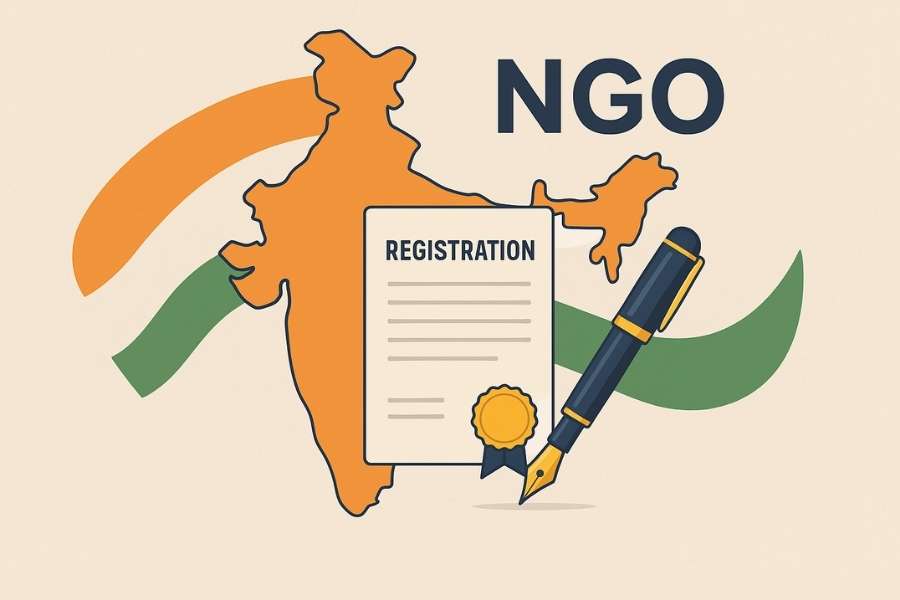So, you have a noble cause, a vision for change, and a desire to make a real impact in India. That’s fantastic! The next crucial step is to formally register your non-governmental organization (NGO). This process might seem daunting with different legal structures available, but choosing the right one is fundamental for your NGO’s long-term success, credibility, and ability to raise funds.
This guide will walk you through the nuances of NGO Registration in India, specifically focusing on the three primary legal forms: Trust, Society, and Section 8 Company. Understanding their differences is key to making an informed decision.
Why Register Your NGO in India?
Before diving into the types, let’s briefly touch upon why registration is non-negotiable for an NGO:
- Legal Identity & Credibility: Registration provides your organization with a legal existence, distinguishing it from individuals. This is vital for public trust and accountability.
- Access to Funding: Most government grants, corporate social responsibility (CSR) funds, and even foreign contributions (via FCRA registration) are only accessible to registered NGOs. This is where a proper Darpan registration becomes essential later on.
- Tax Exemptions: Registered NGOs can apply for tax exemptions under sections like 12A and 80G of the Income Tax Act, allowing donors to claim tax benefits for contributions.
- Asset Holding: A registered NGO can legally hold property, bank accounts, and other assets in its name.
- Enhanced Reputation: Registration signifies legitimacy and commitment, making it easier to collaborate with other organizations, government bodies, and international agencies.
The Three Pillars of NGO Registration in India
India offers three main legal frameworks for non-profit organizations, each governed by a different act and suited for different operational scales and governance preferences.
1. Trust
- Governing Act: The Indian Trusts Act, 1882 (primarily for public charitable trusts, though specific state acts may also apply).
- Key Characteristics:
- Purpose: Usually created for charitable or religious purposes.
- Members: Requires a minimum of two trustees (Settlor and Trustee). There’s no upper limit.
- Governing Document: A ‘Trust Deed’ is the foundational document, outlining the trust’s objectives, rules, and management.
- Registration Authority: Registered with the local Sub-Registrar of the area where the trust deed is executed.
- Credibility: Generally considered less transparent due to fewer mandatory public disclosures compared to a Section 8 Company.
- Management: Managed by a Board of Trustees.
- Flexibility: Offers more flexibility in internal management, but can be less suitable for large-scale operations or when seeking significant institutional funding.
- Best Suited For: Smaller, family-run charitable initiatives, those focusing on localized welfare, or where administrative simplicity is preferred.
2. Society
- Governing Act: Societies Registration Act, 1860 (or relevant state-specific Societies Registration Acts).
- Key Characteristics:
- Purpose: Formed for the promotion of literature, science, fine arts, or for charitable purposes.
- Members: Requires a minimum of seven members to form a society (can be individuals or corporate bodies).
- Governing Document: The ‘Memorandum of Association’ (MoA) and ‘Rules & Regulations’ define the society’s objectives and operational rules.
- Registration Authority: Registered with the Registrar of Societies in the respective state.
- Credibility: Offers a moderate level of credibility, often preferred for educational institutions, clubs, or cultural organizations.
- Management: Managed by a Governing Body or Managing Committee, elected by its members.
- Flexibility: More democratic than a Trust, with regular meetings and elections. Can operate at the state or national level.
- Best Suited For: Organizations with a broader membership base, educational institutions, cultural associations, or those aiming for democratic governance.
3. Section 8 Company
- Governing Act: Companies Act, 2013 (specifically Section 8).
- Key Characteristics:
- Purpose: Formed for the promotion of commerce, art, science, sports, education, research, social welfare, religion, charity, protection of the environment, or any other useful object, provided profits are applied solely for promoting its objectives and no dividend is paid to its members.
- Members: Requires a minimum of two directors and two subscribers (who can be the same individuals).
- Governing Document: Memorandum of Association (MoA) and Articles of Association (AoA), similar to a regular company.
- Registration Authority: Registered with the Ministry of Corporate Affairs (MCA) through the Registrar of Companies (ROC).
- Credibility: Highly credible due to stringent compliance requirements and central government oversight. Often preferred by corporate donors and for international funding.
- Management: Governed by a Board of Directors, similar to a for-profit company, providing a professional management structure.
- Flexibility: Can operate anywhere in India without needing separate state registrations.
- Best Suited For: Large-scale operations, organizations seeking significant CSR funding, international collaborations, or those prioritizing high credibility and a corporate governance structure.
Key Factors to Consider When Choosing Your NGO Structure
- Number of Members: How many people are you involved with? (Trust: 2+, Society: 7+, Section 8: 2+)
- Compliance Requirements: Are you comfortable with stringent annual filings and disclosures? (Section 8 has the highest, Trust the lowest).
- Credibility Needs: How important is public and donor perception for your funding sources? (Section 8 is generally highest).
- Funding Source: Will you primarily seek government grants, CSR funds, or foreign contributions? (Section 8 is often preferred for larger funds).
- Geographical Reach: Do you plan to operate locally, state-wide, or nationally?
- Management Structure: Do you prefer a flexible trustee-based model, a democratic committee, or a more corporate board?
The NGO Registration Process: A General Overview
While specifics vary by type, the general steps include:
- Drafting Foundational Documents: Trust Deed, Memorandum & Articles of Association, Rules & Regulations, depending on the chosen structure.
- Name Approval: (Especially critical for Societies and Section 8 Companies).
- Digital Signatures (DSC) & Director Identification Numbers (DIN): For Section 8 Companies.
- Filing Application: With the relevant Registrar (Sub-Registrar for Trust, Registrar of Societies for Society, ROC for Section 8 Company).
- Obtaining Registration Certificate: Your official proof of legal existence.
- PAN & TAN Application: Essential for financial transactions.
- Bank Account Opening: Crucial for all financial operations.
- Post-Registration Compliance: Including Darpan registration (essential for accessing government funds), 12A & 80G registrations (for tax benefits), and regular annual filings.
Why Choose RegisterKaro for Your NGO Registration?
Navigating these legal complexities can be challenging. This is where an experienced partner like RegisterKaro becomes invaluable. We pride ourselves on simplifying this journey, offering:
- Expert Guidance: Our team of legal and financial experts will help you choose the ideal structure for your vision and handle all drafting and filing.
- Transparent Pricing: No hidden costs, ever. You get a clear, all-inclusive package.
- Efficient Processing: We streamline the entire registration process, ensuring timely and accurate submissions.
- Comprehensive Support: Beyond just registration, we guide you through crucial post-incorporation steps like obtaining 12A, 80G, and Darpan registration, ensuring you’re fully compliant and ready to secure funding.
Starting an NGO is a powerful step towards creating positive change. With the right legal foundation and expert support, you can focus on your mission while we handle the complexities of NGO Registration and compliance.




